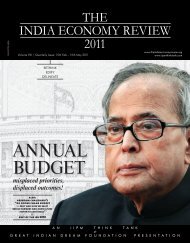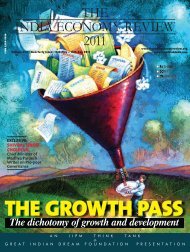Download - The India Economy Review
Download - The India Economy Review
Download - The India Economy Review
Create successful ePaper yourself
Turn your PDF publications into a flip-book with our unique Google optimized e-Paper software.
P LANNING P ARADIGM<br />
began by taking me on a tour of his estab-<br />
lishment that he was about to turn over<br />
to the French government — an end to 10<br />
generations of Rothschild banking dating<br />
to King Louis-Philippe for whom his<br />
forebears had acted as fi nanciers. It was<br />
after the name of this street that the<br />
Rothschilds named their great Bordeaux<br />
estate and its wine label, Chateau Laf-<br />
fi tte. “What a pity,” he said, pausing in his<br />
bank’s wood-paneled boardroom, sweep-<br />
ing his hand across the dozens of por-<br />
traits of his ancestors looking down from<br />
the walls at the large red-leather chairs,<br />
all now empty, that surrounded what<br />
seemed like an acre of polished mahogany.<br />
“<strong>The</strong>y will be staring down on communists,<br />
now sitting around this table.”<br />
In all, thirty-six banks and two fi nance<br />
companies were taken over by the state,<br />
an army of talent turned out, as bureaucrats<br />
moved in and took over. But banking<br />
was only the fi rst industry targeted by<br />
the Socialists. Within a matter of months,<br />
the government had seized control of<br />
seven of the twenty largest industrial<br />
conglomerates in France plus fi ve other<br />
major industrial companies whose workers<br />
numbered some 800,000 individuals.<br />
Every morning, it seemed, the French<br />
awoke to news of another private company<br />
or industry brought under state<br />
control. <strong>The</strong> railroads (SNCF), natural<br />
gas and coal, Paris subways, the two<br />
French airlines (Air France for international<br />
fl ights, and Air Inter for domestic<br />
travel), the auto company Renault, the<br />
state tobacco company SEITA were all<br />
106 THE IIPM THINK TANK<br />
under government control and ownership.<br />
Eventually France was forced to<br />
issue vast quantities of special<br />
bonds to compensate the owners<br />
and shareholders of the nationalized<br />
fi rms — interest payments<br />
alone running 50<br />
billion French francs a year<br />
(between $5 billion and $10<br />
billion depending on the<br />
rate of exchange which<br />
fl uctuated wildly during the<br />
1980s).<br />
France’s experiment with<br />
overwhelming state capitalism<br />
36 banks and 2 fi nance companies<br />
were taken over by the state, as<br />
bureaucrats moved in and took over<br />
didn’t last long, however. <strong>The</strong> nationalizations<br />
proved all but catastrophic to the<br />
French economy, society and the entire<br />
way of life. Moreover, support for the<br />
process all but collapsed. While overwhelmingly<br />
positive through March<br />
1983, by October of that year public<br />
opinion had turned overwhelmingly<br />
negative. <strong>The</strong> Franc had been devalued<br />
for the third time in two years, public<br />
spending was squeezed, and the right<br />
wing, led by the man who would succeed<br />
Mitterrand as President, Jacques Chirac,<br />
was presenting some very attractive alternatives.<br />
Within a matter of months,<br />
the nationalizations had begun to be<br />
reversed. <strong>The</strong> four Communist Party<br />
members had been chucked out of the<br />
cabinet. France was reverting to democratic<br />
capitalism. In 1987, having spent<br />
four years in self-imposed exile in New<br />
York, Baron Guy returned to Paris as his<br />
son David launched the new Rothschild<br />
& Cie Banque in the rue Messine,<br />
barely a mile from the building seized<br />
from his father.<br />
So what is it about democratic capitalism<br />
that makes it more successful —<br />
hence more appealing — than state<br />
capitalism? To a large extent, it’s actually<br />
the very fundamentals of the two<br />
systems that suggest the answer. In state<br />
capitalism, the state dominates the markets<br />
for one particular reason — political,<br />
rather than economic, gain. To accomplish<br />
this, it must necessarily ignore<br />
the central reason for the success of a<br />
company: profi t. When politics becomes<br />
the ultimate corporate driver, the state<br />
must take several measures that so often<br />
is likely to run counter to the success of<br />
a private enterprise. <strong>The</strong> principal motive<br />
for a state-controlled company must<br />
be preservation of jobs, since an employed<br />
worker and his or her family is far<br />
more likely to vote for the incumbent<br />
government in the next election. Corporate<br />
losses mean little when the public<br />
treasury is behind the corporation and<br />
can continue to pump in funds — which





